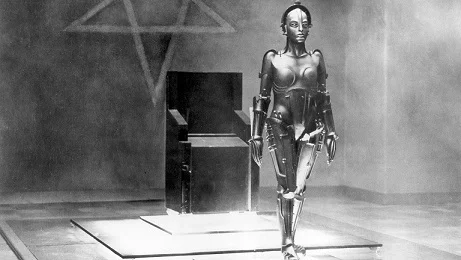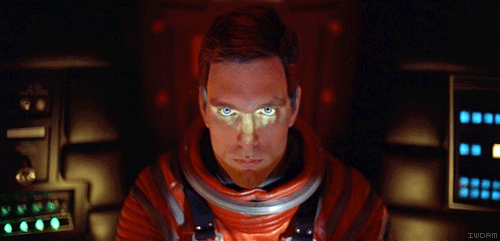“Do you mind if I ask you a personal question?” © Warner Bros. Pictures
Artificial Intelligence is surely here to stay. It’s as common as the warning buzzers in our cars and as complex as robotic surgery. It will continue to expand across new areas and deepen into areas where we take it for granted. The prevailing attitude is often described with the ironic question, “Is there anything that Artificial Intelligence can’t do?”
As I’ve written before, the right question is as vital as the right answer…and I think we’re asking the right question, but I’d ask it without the irony. The world is so ready to adopt and adapt to digital developments, I wonder if we should be more cautious and critical of them. We constantly find and embrace more benefits to AI, but what do we risk? I think that we face two risks if we plow forward with total acceptance: 1.) are we ready for when the computer fails? And 2.) Aren’t there things that only a human can do? It may be intelligence…but it is artificial!
I am not offering an answer to this critical question; but I think that it’s an important question to ask.
When I was first learning math in grade school, we were encouraged always to evaluate the answer that the calculator delivered; we were warned not to grab the answer and move on. “What if you hit a wrong button or the batteries are low or if the calculator malfunctions?” asked Sister Elizabeth. “You need to think enough to judge if the answer seems right!” But those days of reasonable paranoia are gone.
In reality, when we face life-and-death reliance on technology and artificial intelligence—air travel and space exploration are extreme examples—we usually rely on “redundant” systems, back-up systems used “just in case” the primary system fails. Thus we trust technology, but we have a back-up…like Reagan’s adage to the Russians, “Trust, but verify.” Hasn’t everyone run into an app or a website that just won’t work the way it’s supposed to? I’ve pulled into the airport parking garage only to find that I can’t get my ticket on my phone. I’ve had Spotify recommend horrible playlists…supposedly based on my listening habits! Today, I had a wrist blood-pressure device that read my blood pressure at 160/93…fortunately the nurse took my pressure by hand (124/72) rather than rush me to the ER!
We have long lived with that fear, the fear of technology run amok. How many movies tell a tale where technology becomes the enemy:
”Give me another 24 hours—and no one…will be able to tell a Machine-Man from a mortal!”
As early as 1927, Fritz Lang’s Metropolis showed the insidious side of technology when the iconic robot replaces the angelic Maria and brings about chaos and destruction.
“Open the pod bay door, please, HAL.”
In 1968’s 2001: A Space Odyssey, the computer, HAL 9000, both ran the mission and developed a mind of its own. “I know that you and Frank were planning to disconnect me. And I'm afraid that's something I cannot allow to happen,” he warns Dave as the two begin a battle of wits to survive.
“I’ve seen things you people wouldn’t believe.” © The Ladd Company
In 1982’s Blade Runner, androids have a genetically engineered death date to limit their threat to humans; a group of them returns to Earth in search of “more life.” The android leader, Roy Batty (Rutger Hauer), tells his nemesis, Rick Deckard (Harrison Ford), “Quite an experience to live in fear, isn't it?”
Irreplaceable Humanity
What of the things that only a human can do, things of which a computer is incapable…at least so far. There is a human side of perception and thought, the miraculous side of epiphany and inspiration, that computers can’t really do yet. The human side of perception and thought that is not the result of logic and can’t yet be loaded into a databank resource. AI grows through programming, then extends itself through machine learning—analytical model building that identifies patterns in the resource to “make its own decisions.” But to my understanding—and no one, not even my geekiest computer friends—has contradicted me on this: epiphany and inspiration are beyond the realm of AI and will remain there for quite some time. Perhaps forever. If an apple were ever to fall onto a computer, the computer would never imagine gravity. If a beautiful woman were to pass by a computer, it would never imagine, “Shall I compare thee to a summer’s day.” Even if all the notes and instrumental voices were loaded into a computer, it would never imagine Pavoratti’s “Nessun Dorma.”
I welcome AI as it continues to make many things better. I don’t get lost now with GPS, I enjoy the connectivity of my smart phone, I love the ease of voice-command cable TV. But to answer my opening question, “Is there anything that Artificial Intelligence can’t do?” I think the answer begins, “AI can do almost everything, except replace the inspirations of humanity.” I know at times that I want only the warm consideration of human thought and interaction. I love how genuine—how un-artificial—human thought and interaction can be.



